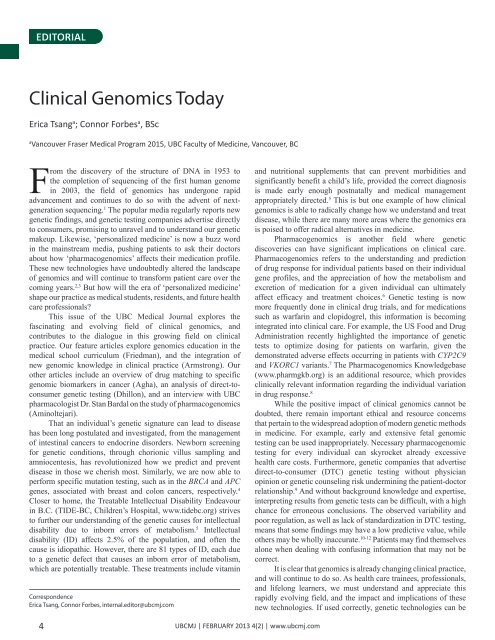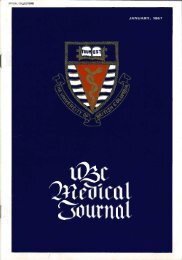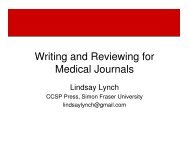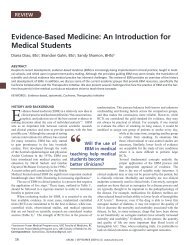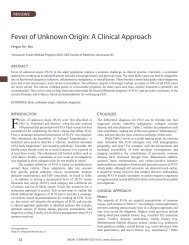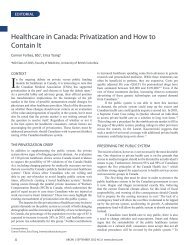Download full PDF - UBC Medical Journal
Download full PDF - UBC Medical Journal
Download full PDF - UBC Medical Journal
You also want an ePaper? Increase the reach of your titles
YUMPU automatically turns print PDFs into web optimized ePapers that Google loves.
EDITORIAL<br />
Clinical Genomics Today<br />
Erica Tsang a ; Connor Forbes a , BSc<br />
a<br />
Vancouver Fraser <strong>Medical</strong> Program 2015, <strong>UBC</strong> Faculty of Medicine, Vancouver, BC<br />
From the discovery of the structure of DNA in 1953 to<br />
the completion of sequencing of the first human genome<br />
in 2003, the field of genomics has undergone rapid<br />
advancement and continues to do so with the advent of nextgeneration<br />
sequencing. 1 The popular media regularly reports new<br />
genetic findings, and genetic testing companies advertise directly<br />
to consumers, promising to unravel and to understand our genetic<br />
makeup. Likewise, ‘personalized medicine’ is now a buzz word<br />
in the mainstream media, pushing patients to ask their doctors<br />
about how ‘pharmacogenomics’ affects their medication profile.<br />
These new technologies have undoubtedly altered the landscape<br />
of genomics and will continue to transform patient care over the<br />
coming years. 2,3 But how will the era of ‘personalized medicine’<br />
shape our practice as medical students, residents, and future health<br />
care professionals<br />
This issue of the <strong>UBC</strong> <strong>Medical</strong> <strong>Journal</strong> explores the<br />
fascinating and evolving field of clinical genomics, and<br />
contributes to the dialogue in this growing field on clinical<br />
practice. Our feature articles explore genomics education in the<br />
medical school curriculum (Friedman), and the integration of<br />
new genomic knowledge in clinical practice (Armstrong). Our<br />
other articles include an overview of drug matching to specific<br />
genomic biomarkers in cancer (Agha), an analysis of direct-toconsumer<br />
genetic testing (Dhillon), and an interview with <strong>UBC</strong><br />
pharmacologist Dr. Stan Bardal on the study of pharmacogenomics<br />
(Aminoltejari).<br />
That an individual’s genetic signature can lead to disease<br />
has been long postulated and investigated, from the management<br />
of intestinal cancers to endocrine disorders. Newborn screening<br />
for genetic conditions, through chorionic villus sampling and<br />
amniocentesis, has revolutionized how we predict and prevent<br />
disease in those we cherish most. Similarly, we are now able to<br />
perform specific mutation testing, such as in the BRCA and APC<br />
genes, associated with breast and colon cancers, respectively. 4<br />
Closer to home, the Treatable Intellectual Disability Endeavour<br />
in B.C. (TIDE-BC, Children’s Hospital, www.tidebc.org) strives<br />
to further our understanding of the genetic causes for intellectual<br />
disability due to inborn errors of metabolism. 5 Intellectual<br />
disability (ID) affects 2.5% of the population, and often the<br />
cause is idiopathic. However, there are 81 types of ID, each due<br />
to a genetic defect that causes an inborn error of metabolism,<br />
which are potentially treatable. These treatments include vitamin<br />
Correspondence<br />
Erica Tsang, Connor Forbes, internal.editor@ubcmj.com<br />
and nutritional supplements that can prevent morbidities and<br />
significantly benefit a child’s life, provided the correct diagnosis<br />
is made early enough postnatally and medical management<br />
appropriately directed. 5 This is but one example of how clinical<br />
genomics is able to radically change how we understand and treat<br />
disease, while there are many more areas where the genomics era<br />
is poised to offer radical alternatives in medicine.<br />
Pharmacogenomics is another field where genetic<br />
discoveries can have significant implications on clinical care.<br />
Pharmacogenomics refers to the understanding and prediction<br />
of drug response for individual patients based on their individual<br />
gene profiles, and the appreciation of how the metabolism and<br />
excretion of medication for a given individual can ultimately<br />
affect efficacy and treatment choices. 6 Genetic testing is now<br />
more frequently done in clinical drug trials, and for medications<br />
such as warfarin and clopidogrel, this information is becoming<br />
integrated into clinical care. For example, the US Food and Drug<br />
Administration recently highlighted the importance of genetic<br />
tests to optimize dosing for patients on warfarin, given the<br />
demonstrated adverse effects occurring in patients with CYP2C9<br />
and VKORC1 variants. 7 The Pharmacogenomics Knowledgebase<br />
(www.pharmgkb.org) is an additional resource, which provides<br />
clinically relevant information regarding the individual variation<br />
in drug response. 8<br />
While the positive impact of clinical genomics cannot be<br />
doubted, there remain important ethical and resource concerns<br />
that pertain to the widespread adoption of modern genetic methods<br />
in medicine. For example, early and extensive fetal genomic<br />
testing can be used inappropriately. Necessary pharmacogenomic<br />
testing for every individual can skyrocket already excessive<br />
health care costs. Furthermore, genetic companies that advertise<br />
direct-to-consumer (DTC) genetic testing without physician<br />
opinion or genetic counseling risk undermining the patient-doctor<br />
relationship. 9 And without background knowledge and expertise,<br />
interpreting results from genetic tests can be difficult, with a high<br />
chance for erroneous conclusions. The observed variability and<br />
poor regulation, as well as lack of standardization in DTC testing,<br />
means that some findings may have a low predictive value, while<br />
others may be wholly inaccurate. 10-12 Patients may find themselves<br />
alone when dealing with confusing information that may not be<br />
correct.<br />
It is clear that genomics is already changing clinical practice,<br />
and will continue to do so. As health care trainees, professionals,<br />
and lifelong learners, we must understand and appreciate this<br />
rapidly evolving field, and the impact and implications of these<br />
new technologies. If used correctly, genetic technologies can be<br />
4<br />
<strong>UBC</strong>MJ | FEBRUARY 2013 4(2) | www.ubcmj.com


